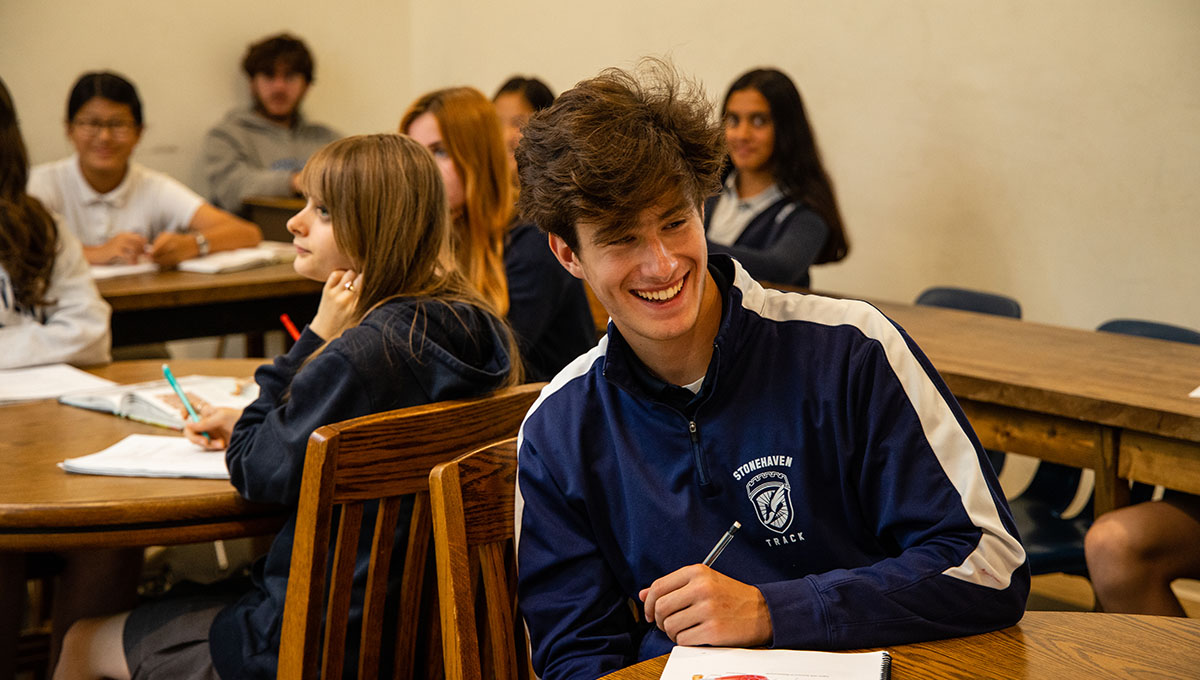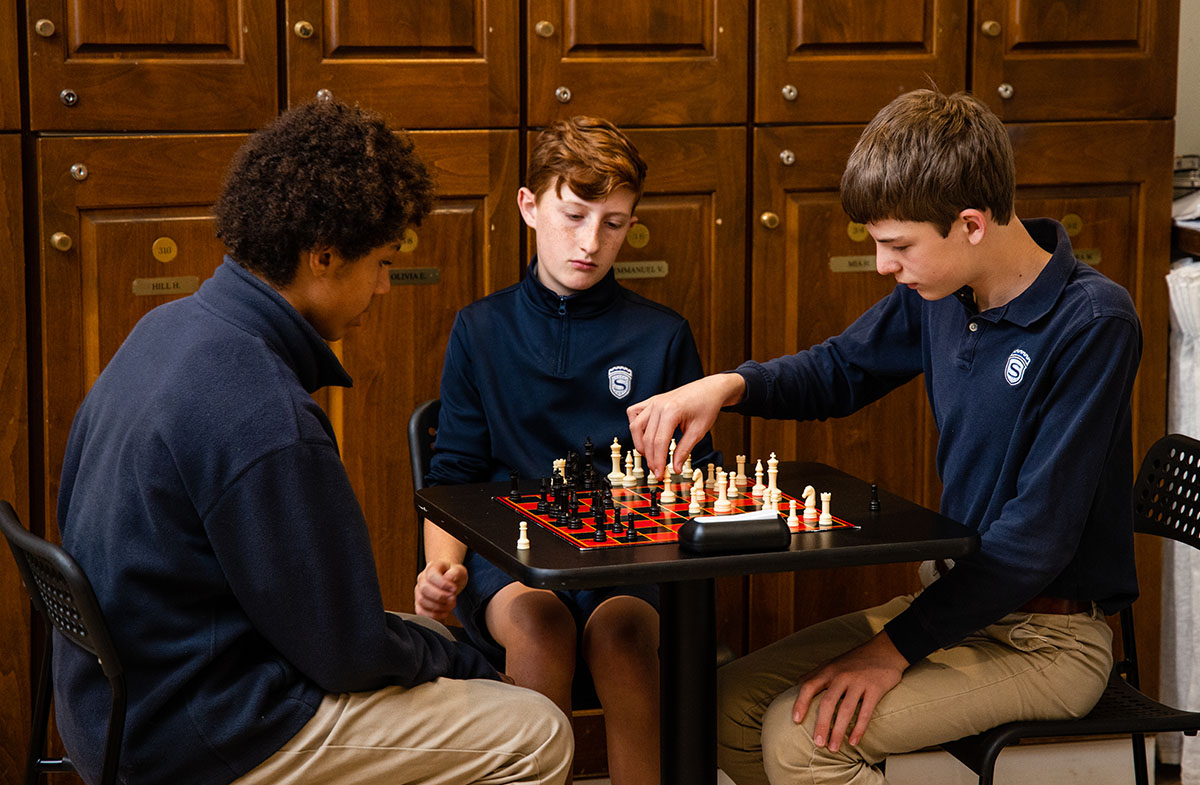We live in a culture dominated by numbers. When asked how a child performed in their math class, the temptation is to think a number like 86 or the letter B can communicate the child's ability. How much does this really tell us? It tells us something but it does not tell us the whole story. Too many educational experts rely upon decontextualized data to show the success or failure of modern education. A child's success cannot be reduced to numbers in a grid. Success in school and success in life for the Christian student cannot be accurately measured with numbers or letter grades. The story of a child's education cannot be fully captured by standardized test scores or in a two page transcript sent to an elite university.
Aim of Classical Christian Education
The goals of a classical Christian education are founded upon the belief that education should seek a higher purpose. Success is measured by the type of young men and women we graduate. When the child walks across the graduation stage, parents and faculty can finally stand back to observe and assess the fruit of their labor. It is our prayer to see a graduate that possesses wisdom, humility, fortitude and creativity. This is the evidence of success... not a high SAT score. Another graduate walks across the graduation stage with courage, grace, poise and compassion. This is when a school knows they have honored God with their educational philosophies and methods. The goal is not to form and shape a person that can do something but rather a person that can be someone. 1 The ultimate goal is a person. A person prepared and equipped to use their gifts and talents in service of God and others. The core values of the Christ-centered classical education at Stonehaven is to graduate young men and women who:
- Love God with all their heart, soul, mind, and strength;
- Evaluate all human knowledge and experience in the light of the Scriptures;
- Are equipped to engage and shape the culture with the Truth of the Gospel;
- Listen carefully, reason soundly, speak precisely, and articulate persuasively;
- Have mastered a core body of knowledge and are capable of discussing great ideas;
- Possess a life-long passion for learning and know how to apply the tools of learning;
- Lead and serve with humility, gratitude, and grace.
The end of learning is to repair the ruins of our first parents by regaining to know God aright, and out of that knowledge to love him, to imitate him, to be like him, as we may the nearest by possessing our souls of true virtue, which being united to the heavenly grace of faith makes up the highest perfection." - John Milton
For thousands of years a classical liberal arts education sought to train up students with wisdom and virtue. This is a monumental task. Training a child to serve God with wisdom and virtue is much more challenging than teaching Calculus, Latin or AP Physics. This is what makes the mission of Stonehaven so powerful and exciting. What are the distinctive features of a classical liberal arts education?

Trivium
Classical education is centered on teaching students three core subjects; grammar, logic and rhetoric. The Latin word trivium means the "place where three roads meet" hence it was the teaching of these three disciplines that provided an organized way of helping students become thoughtful, intentional and independent problem solvers.
- Grammar teaches the fundamental elements and ideas of a subject
- Logic develops the mechanics of thought and analysis in a student
- Rhetoric trains the student how to use language to persuade a listener
Only in the last 150 years have we questioned the value and power of the classical approach. Understandably, many wonder if the classical philosophy is still relevant and useful in the modern age. "This is a different time with different educational needs..." is the essence of arguments against classical Christian education. The resurgence of classical education in the last thirty years argues however that this approach to education remains the most effective way to train a student for God's calling on their life. There is nothing new under the sun (Ecclesiastes 1:9) and the way to cultivate wise and virtuous children does not change over time. Regardless of whether or not a child is destined to be a doctor or a plumber, a classical education prepares them well to fulfill their calling for the honor and glory of God.
In a lecture at Oxford University in 1954, philosopher Dorothy Sayers urged her peers to return to a classical approach to learning. 3 In this lecture she made an insightful connection between the three subjects of the trivium with three developmental stages of a child.
Grammar Stage - Through sixth grade, students are naturally inclined towards the acquisition of knowledge. They are like sponges seeking to acquire more and more facts. Sayers said, "At this age, one readily memorizes the shapes and appearances of things; one likes to recite the number-plates of cars; one rejoices in the chanting of rhymes and the rumble and thunder of unintelligible polysyllables; one enjoys the mere accumulation of things." 4 Therefore, Stonehaven capitalizes on this natural disposition of a child and holds a remarkably high standard for what a child can memorize and retain. To aid in this "accumulation," teachers use a plethora of creative songs, chants, sound-offs, dramas and recitations that help a child remember important information from their curriculum. Visitors are often astounded to see what our children are learning in the classroom.
Logic Stage - Children will naturally grow up and "graduate" from the grammar phase. Roughly coinciding with children in 7th-9th grade children will enter the Logic stage. At this age students are "characterized by contradicting, answering back, liking to "catch people out" (especially one's elders); and by the propounding of conundrums. Its nuisance-value is extremely high." 5 Adults that interact with middle school students on a daily basis can relate to the high "nuisance-value" of these children. However, this phase of a child provides a unique opportunity to direct their fledgling attempts at logical thinking in a God-honoring way. A classical school does not squelch this child's curiosity and questioning but rather engages with it and helps train them to make logically valid arguments based upon sound reasoning. The end result is a student that thinks logically and critically.
Rhetoric Stage - The next phase, called the capstone of the trivium, coincides with students in 10th-12th grade. The goal at this stage is to teach a child the art of expression. The classical Christian student is taught to speak precisely, reason soundly and articulate persuasively. Sayers describes the nature of these students, "It is self-centered; yearns to express itself; it rather specializes in being misunderstood; it is restless and tries to achieve independence; and, with good luck and good guidance, it should show the beginnings of creativeness; a reaching out towards a synthesis of what it already knows, and a deliberate eagerness to know and do some one thing in preference to all others." 6 The elements of rhetoric are the most neglected in our modern schools. And yet, this is critically important to forming a well-rounded individual prepared to engage and redeem our culture.

Tools of Learning
Sayers observed in her essay The Lost Tools of Learning , "Is not the great defect of our education today... that although we often succeed in teaching our pupils 'subjects,' we fail lamentably on the whole in teaching them how to think: they learn everything, except the art of learning." 7 She is arguing against the idea that schools are to be "knowledge factories" where we pour disconnected facts, information and ideas into an empty receptacle; the child's brain. More important than imparting information, a school teaches children "the art of learning." A child full of information and facts is not necessarily ready for independence. Schools must be equipping children with the "tools of learning" which prepare a child to learn new things independently. William Butler Yeats said, "Education is not the filling of a pail, but the lighting of a fire." The goal of a classical educator is to instill a passion for learning in a child that will never cease to burn.
Wisdom and Virtue
What is wisdom and virtue? What is truth, beauty and goodness? We live in an educational environment where schools and teachers are unable to answer truthfully the fundamental questions of life. Classical Christian education provides a necessary and refreshing option for Christian parents who have been called to raise up their children in the nurture and admonition of the Lord (Ephesians 6:4). Wisdom, virtue, truth and beauty find their definition in the character of God and not the autonomous wisdom of man. Education will always either be man-centered or God-centered. We strive to cultivate Godly virtue in our children because this reflects the very character of God to a broken world.
Conclusion
We stand amidst an educational system in ruins. Schools continue to overhaul the curriculum and standards every few years desperately searching for a quick-fix answer to their problems. Low standards, bad teachers, little money, and so on go the excuses for the failure of our modern schools. These excuses are merely the tip of the iceberg. The root of the problem lies in their overarching goal to develop "productive citizens" who can take their place as cogs in the industrial workforce. This view separates education from the divine purpose of redemption. God desires to see his children equipped to be agents of redemption in this fallen world. C.S. Lewis said,
Aim at heaven and you will get earth thrown in. Aim at earth and you get neither.The education at Stonehaven aims for heaven by training up children prepared to redeem God's kingdom on earth. We invite you to visit Stonehaven to learn more about our Christ-centered classical education.
Notes
1 Christopher A. Perrin, "An Introduction to Classical Education" (Camp Hill, PA, Classical Academic Press, 2004).
2 John Milton, "On Education" in The Harvard Classics, vol. 3 (New York, Collier and Sons: 1910), 286.
3 Dorothy Sayers, "The Lost Tools of Learning" paper read as a lecture Oxford Vacation Course, 1947.
4 Ibid.
5 Ibid.
6 Ibid.
7 Ibid.


